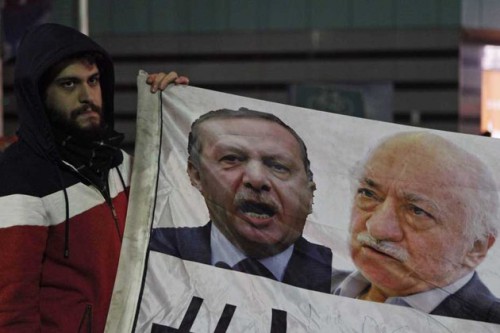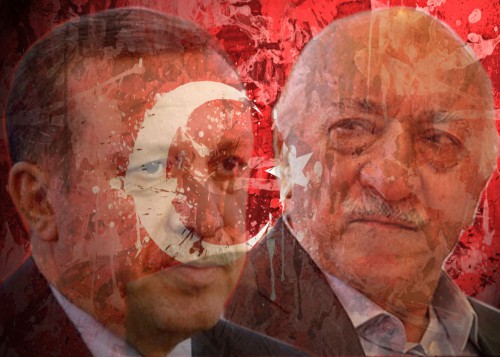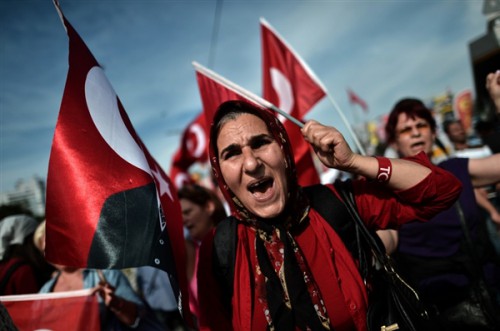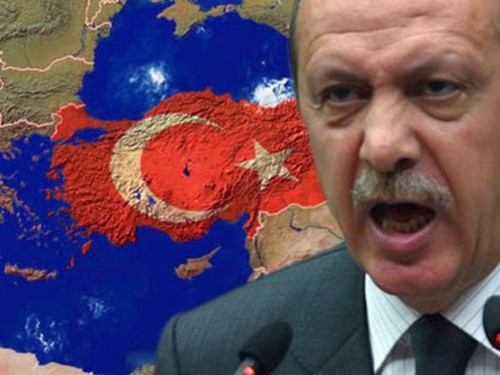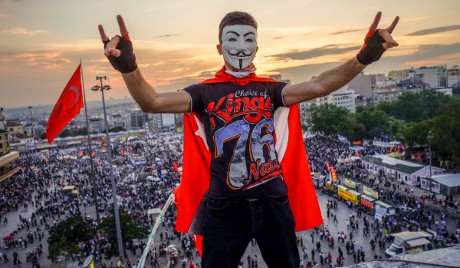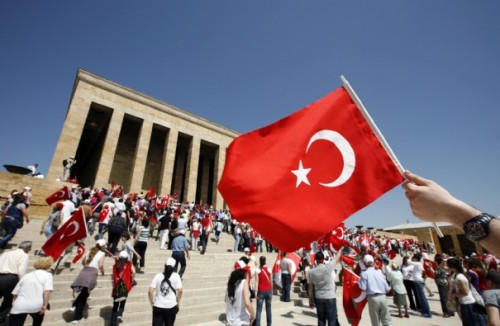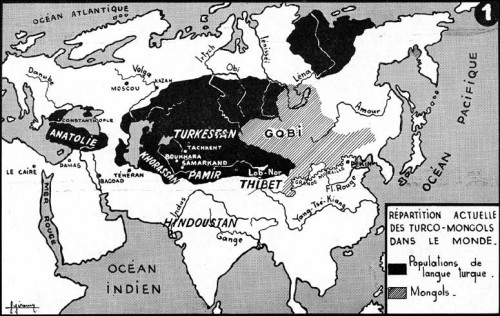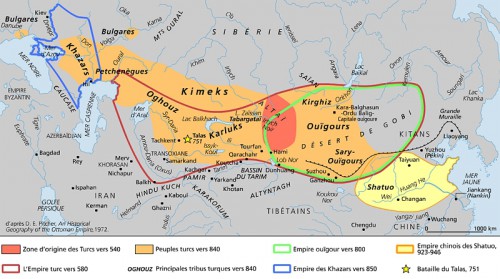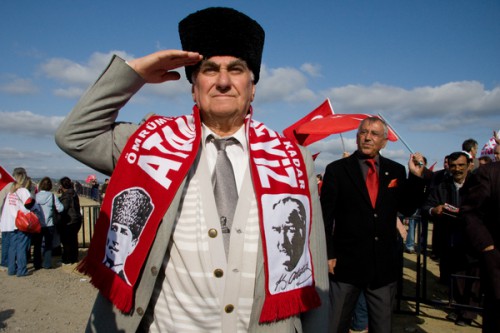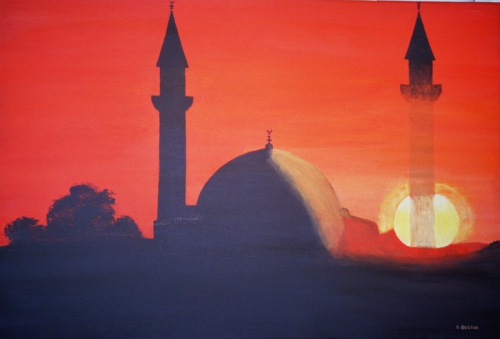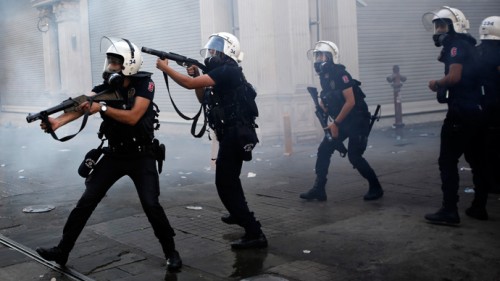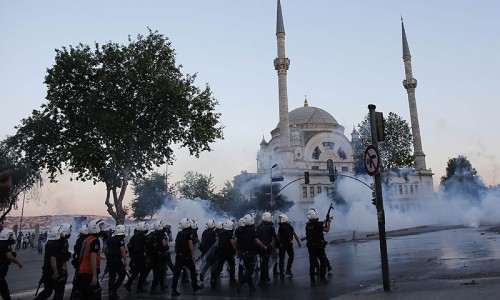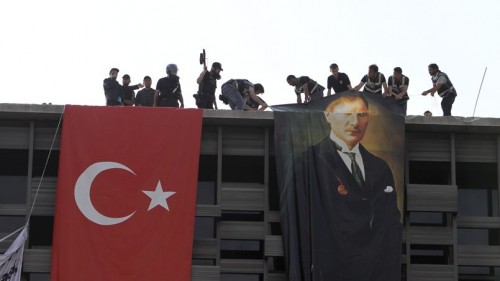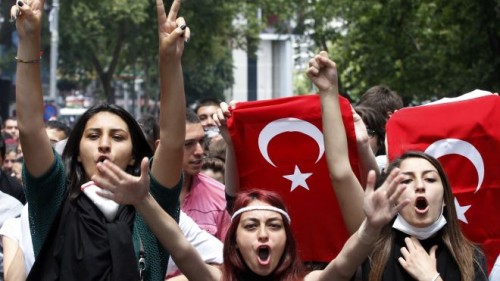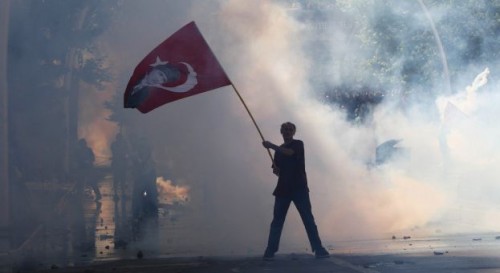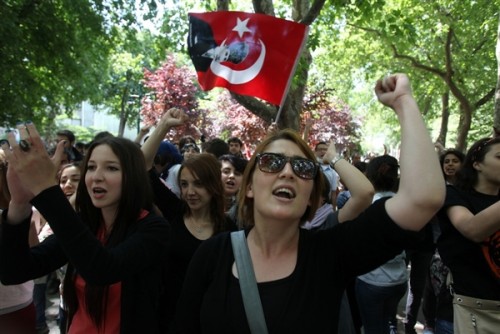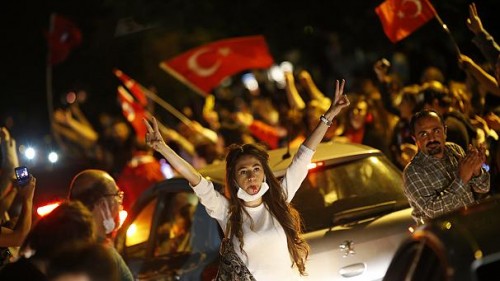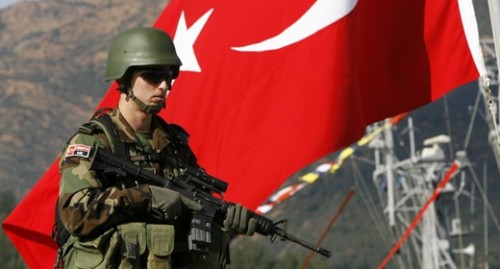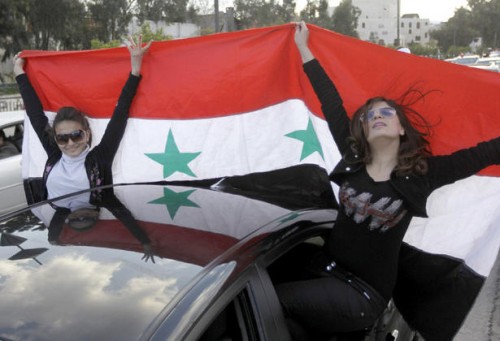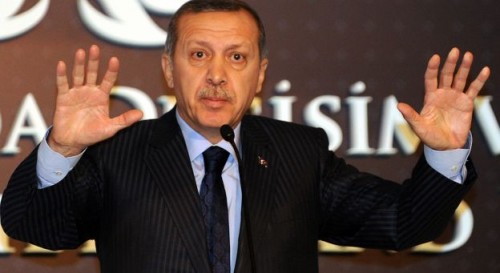
Inconnaissance d’Erdogan
Ex: http://www.dedefensa/
Commençons par le cas de notre ami M.K. Bhadrakumar, commentateur distingué des questions de relations internationales, ancien diplomate indien qui fut notamment ambassadeur, et précisément ambassadeur en Turquie puisque c’est là où nous voulons en venir. M.K. Bhadrakumar est manifestement opposé à l’hégémonie US, aux méthodes US, etc., et il ne cesse de critiquer son propre gouvernement (indien) pour n’être pas assez ferme contre les pressions US. De ce point de vue, il est plutôt pro-russe et, sans aucun doute, manifeste une extrême considération pour les dirigeants russes, surtout Poutine et Lavrov. D’un autre côté Bhadrakumar a gardé un esprit type “guerre froide” et il n’aime jamais plus une situation que lorsqu’elle s’arrange selon des lignes diplomatiques d’une entente raisonnable et réaliste entre les deux “superpuissances” traditionnelles de l’époque Guerre froide ; nous considérerions plutôt ce dernier point de sa méthode comme une faiblesse tant nous estimons que cette sorte de rapports est dépassé, que l’intrusion du Système, la formation du bloc BAO, etc., ont changé tous les facteurs et interdisent un retour à une telle diplomatie. Voilà donc notre perception de la méthodologie et du fondement du travail de commentateur de Bhadrakumar, qui indique précisément combien il peut nous servir, à nous, de référence utile.
… Il le peut, notamment à propos de la crise turque, bien sûr, en raison de son expérience d’ambassadeur et des contacts qu’il a gardé à Ankara. Or, sa position est extrêmement originale par rapport à la “ligne” qu’on serait tenté de suivre dans cette affaire turque, si l’on veut une ligne absolument antiSystème, – ce qui est notre cas. (Nous-mêmes, nous rangeons en général le commentaire de Bhadrakumar effectivement selon cette ligne antiSystème, que cela soit ou non assumé consciemment dans son chef.) M.K. Bhadrakumar a fait au moins deux textes sur la crise turque depuis qu’elle a éclaté, un sur Asia Times (le 5 juin 2013), l’autre sur son propre blog (Indian PunchLine), le 7 juin 2013. Sa position est la suivante : Erdogan est victime d’une attaque qui a la forme d’une sorte de manœuvre, ou un complot si l'on veut, soutenue par les USA, qui est le fait d’une fraction à l’intérieur de son gouvernement, avec le vice-Premier ministre Arinç et le président Gül, tout cela sous l’inspiration de Fetullah Gulen, grand intellectuel turc résidant aux USA que Arinç a récemment salué comme “la conscience de 75 millions de personnes” en Turquie. Bien sûr et selon cette interprétation, Gulen serait l’âme du complot ourdi par les USA, à partir des USA, selon l'orientation de l’habituelle stratégie de regime change bien connue des USA.
«But the attempt will fail because the AKP is Erdogan — and Erdogan is AKP. The party’s phenomenal rise is almost entreily due to his charisma and political vision and his great organizing capacity. There is a subtle attempt to project Erinc and Gul as “founding fathers” or members of the “triumvira” of the AKP, but it is a silly joke. It is Erdogan who fired up the Anatolian Turk and Erinc and Gul have been largely beneficiaries of Erdogan’s rise.
»In essence, Erdogan has bluntly told Washington to back off. He is ignoring the admonitions by the Obama administration, which issued not less than 6 condemnatory statements in five days alone at the level of the White House and state department, including a demarche with Ankara to order investigation into the “excessive use of force.” The Obama administration made a grave error of judgment by encouraging Gulen to move against Erdogan. True, Erdogan is not the kind of person who can be trusted to pursue the American diktat. But then, he is a proud Turk and he knows he draws his strength from the people.
»The contradiction here is that Erdogan also has a tryst with the New Middle East and it is at odds with the US’s regional agenda. Washington’s blueprint is to have “islamic” regimes backed by the legitimacy of elections replace the pro-western autocrats in the New Middle East so that regional stability and security is strengthened, but provided these “Islamists” are under American thumb. However, Egypt’s Mohamed Morsi is showing that the islamists have a mind of their own, too. The US is disenchanted with Morsi. Now, Erdogan is a staunch supporter of Morsi and is himself an Islamist.
»Again, Obama has failed to bring about a Israel-Turkey patch-up. Erdogan’s visceral hatred of Israel is such that so long a he remains in power, Turkey’s reconciliation with Israel is out of the question. Besides, Erdogan is threatening to visit Gaza despite Washington’s warnings against it. All this puts US regional policies in a bind. Unsurprisingly, the American media, which is heavily under the Israeli Lobby’s influence, is giving Erdogan hell in the current standoff.
»If Erdogan smashes up this formidable challenge to his place in the history of Turkey and the Muslim world, it will be something like what Ronald Reagan famously said once in his address to the nation in 1984 — “You ain’t seen nothing yet.”»
On comprend combien tout cela interfère avec plus ou moins de profondeur sur la position naturelle qui est prise dans cette crise turque, notamment par les commentateurs antiSystème dont nous sommes. On observera, et nous le rappelons en renvoyant à notre texte du 3 juin 2013, que nous ne faisons pas un procès général à Erdogan et que nous ne nous intéressons guère à la situation politique intérieure en Turquie telle qu’elle est, notamment dans le champ des positions à l’intérieur de la direction politique, et à l’intérieur du parti AKP d’Erdogan. La question de l’islamisme du parti AKP par rapport aux tendances dites “laïques” ou “kémalistes”, voire par rapport à la question de la “démocratie”, – selon l’interprétation-BAO qui frétille d’intérêt à l’égard de cette sorte de débat “sociétal”, – ne nous intéresse pas davantage. Pour l’essentiel, notre appréciation de l’une des causes centrales, voire de la cause principale de l’ampleur prise par les événements, est notre constat qu’Erdogan a perdu sa légitimité en pervertissant brutalement une politique extérieure brillante, de type “gaulliste”, qui lui avait assuré une position extrêmement puissante et ferme, celle qu’assure la légitimité justement… Bien entendu, il s’agit de la Syrie, comme nous l’affirmions le 3 juin 2013...
«Erdogan avait construit sa légitimité en développant cette politique extérieure s’orientant vers l’indépendance nationale, l’établissement de liens hors bloc BAO (avec la Russie, avec l’Iran), enfin la rupture avec Israël au nom de la condamnation de l’illégitimité des actions de force israéliennes, caractéristiques de l’“idéal de puissance” qui inspire toutes les velléités d’actes politiques du bloc BAO. Il avait ainsi construit un “modèle turc”, absolument fondé sur les principes de souveraineté et d'équilibre des relations internationales (“idéal de perfection”, selon Guglielmo Ferrero) qui fondaient à leur tour sa propre légitimité. La Syrie a changé tout cela, en découvrant certainement un problème individuel de caractère et de perversion psychologique dans le chef d’Erdogan, interférant gravement sur la brillante dimension collective d'un destin... […] Erdogan a donc troqué la légitimité qui implique la domestication de la force par l’établissement de l’équilibre des producteurs de force que sont les nations et autres entités, au profit d’une ambition hégémonique relevant effectivement de l’“idéal de puissance” et, dans son chef personnel, d’un déséquilibre psychologique dont l’hubris est une des productions les plus dévastatrices. Le résultat net, absolument paradoxal, a été que la Turquie est retombée, par la voie de l’imbroglio syrien, dans l’orbite du bloc BAO (USA, OTAN, Israël, etc.)… […]
»Notre conviction est que cet aspect puissant de l’évolution turque et de l’évolution d’Erdogan joue un rôle fondamental dans la crise actuelle, où aspects intérieur et extérieur se mélangent pour organiser la perception d’un dirigeant politique légitime perverti dans la délégitimation, et instituer un jugement de condamnation que nourrit la psychologie ainsi orientée. C’est bien la dissolution puis l’entropisation de la légitimité d’Erdogan qui assurait son autorité, qui ont conduit par contraste à l’affirmation d’un autoritarisme illégitime, qui alimente la revendication et la colère populaires…»
Nous ne retirons pas une ligne de ce commentaire, qui assure qu’il y a au départ de la crise turque ce malaise de l’illégitimité ; cela ne contredit pas absolument M.K. Bhadrakumar, qui ne fait pas du “complot” USA-Gulden la cause de tous les événements, sans d’ailleurs préciser exactement son appréciation. Il y a, pour nous, l’observation qu’on peut trouver une explication acceptable de compromis des deux analyses en avançant que le “complot” n’a fait que “prendre le train en marche” d’une contestation que nous jugeons et continuons à juger comme politiquement spontanée, et psychologiquement explicable à partir du malaise de l’illégitimité. (“Malaise de l’illégitimité”, donc malaise du à la politique syrienne d’Erdogan puisque cette politique l’a délégitimé.)
(Les seuls points précis où il peut y avoir contestation, désaccord formel entre Bhadrakumar et nous, se trouvent dans l’évaluation que nous donnons de la position du président Gül, que nous jugeons plutôt adversaire de la politique syrienne d’Erdogan, et par conséquent plutôt anti-US, comme certains faits ont semblé le montrer. Sur ce point, Bhadrakumar est d’un avis complètement opposé, et nous devons prendre en compte sa profonde connaissance du monde politique turc, ce qui implique la possibilité d’une erreur de notre part. Ce n’est de toutes les façons pas essentiel.)
D’autre part, il est remarquable d’observer que, dans sa défense d’Erdogan, Bhadrakumar ne dit pas grand’chose, et dans tous les cas rien du tout dans son texte sur Indian PunchLine, de la politique syrienne d’Erdogan ; surtout, il n’en fait à aucun moment d’appréciation critique, se contentant de la citer pour signaler la position de l’un ou l’autre acteur par rapport à Erdogan. Or, dans plusieurs textes depuis l’engagement syrien d’Erdogan et précédant les événements actuels , et notamment dans celui dont nous nous faisions l’écho le 30 avril 2012, M.K. Bhadrakumar déplorait dans des termes catégoriques et d’une grande force la dérive syrienne de la Turquie, et particulièrement d’Erdogan, exactement selon la même analyse que nous faisons : si brillant (si brillamment antiSystème) jusque là, Erdogan s’est complètement “perdu” dans ce cas jusqu’à se retrouver “dans le sillage des USA” ; Erdogan, littéralement, “a perdu le Nord”. (Ce qui est traduit par nous par le constat désolé qu’il a perdu sa légitimité en abandonnant de facto son orientation antiSystème.)
«…But Turkey is getting things horribly wrong in its foreign policy. The curious thing is that Erdogan’s foreign policy lacks a national consensus and yet this politician who is an ardent democrat is nonchalantly pressing ahead. The intellectuals I met are aghast that Turkey is reclaiming its Ottoman legacy and is needlessly getting entangled in the Muslim Middle East. […]
»Isn’t Turkey following the footsteps of the US — getting bogged down in quagmires some place else where angels fear to tread, and somewhere along the line losing the plot? I feel sorry for this country and its gifted people. When things have been going so brilliantly well, Erdogan has lost his way.»
M.K. Bhadrakumar ne s’explique pas de tout cela : pourquoi et comment Erdogan, a-t-il “perdu le Nord” ? Pourquoi et comment Erdogan le retrouverait-il, ce qui est nécessairement implicite dans le jugement que fait M.K. Bhadrakumar de la crise turque puisqu’il place à nouveau Erdogan, qui s’était fourvoyé “dans le sillage des USA”, en opposition à ces mêmes USA, dans une vertu antiSysème qu’il aurait effectivement retrouvée ?
Pour l’instant nous n’avons pas de réponse. Nous n’avons aucune raison de croire que M.K. Bhadrakumar, de son côté, “has lost his way”. Il reste absolument consistant dans son appréciation critique des USA, de leur politique d’interventionnisme humanitariste si complètement déstructurante et dissolvante, bref dans ce que nous jugeons être sa ligne antiSystème. On le voit bien dans son dernier commentaire (du 8 juin 2013) sur la nomination de Rice et de Power, qui rencontre parfaitement le notre (le 6 juin 2013).
«The appointment of Susan Rice as national security advisor and of Samantha Power as the envoy to the United Nations becomes extremely intriguing because it doesn’t fit into a straitjacket… […] But Obama would know he is letting loose two cats among pigeons — secretaries of state and defence, John Kerry and Chuck Hagel. Rice and Power by their record are the very antithesis of Kerry and Hagel. They are two noisy exponents of the doctrine of interventionism and had a whale of a time with Hillary Clinton around… […]
»One would like to be a fly on the wall when or if Rice gets around to a face-to-face meeting with Russia’s Vladimir Putin or China’s Xi Jinping. Her predecessor Thomas Donilon felt at ease in Beijing and Moscow. Donilon is leaving behind a commendable legacy in piloting the US foreign policy through a transformative period in history, which Rice will be hard-pressed to match… [W]hat went on in Obama’s complicated mind by introducing two contrarian personalities into his foreign policy team at this point when the world is turning around in its axis? He would know that an inner harmony is useful when coping with such utter disharmony abroad and the US needs to navigate its way forward to a new era where it is a much lesser superpower than during the past several decades…»
La Turquie est entrée dans la crise du Système
Nous sommes donc face à une énigme, qui n’est pas catastrophique ni fondamentale, loin de là, qui représente même une remarquable opportunité de préciser aussi bien un commentaire politique qu’une méthodologie d’analyse. Nous notons bien entendu que les deux “partis” ont de bons arguments : M.K. Bhradakumar a ses qualités de commentateur antiSystème dont nous sommes parfaitement conscients, il a sa connaissance aigue du monde politique turc, ses réseaux, la confiance dont il bénéficie dans ces milieux comme ancien diplomate indien, enfin une explication consistante de la thèse qu’il expose selon laquelle le parti antiSystème (anti-US) est du côté d’Erdogan. Il y a de l’autre côté la politique syrienne voulue et conduite par Erdogan, qui l’a ramené “dans le sillage des USA”, comme s’il avait “perdu le Nord”, et donc lui a fait prendre une politique contraire à la logique antiSystème (choses que Bhadrakumar était le premier à dénoncer in illo tempore). L’énigme est donc pour nous, pour l’instant, indéchiffrable, et il serait stupide et vain de vouloir la déchiffrer parce qu’elle doit être considérée comme accessoire, conduisant à faire de la recherche de sa résolution une perte de temps et une cause de désordre intellectuel déplaçant le centre d’intérêt de l’essentiel à l’accessoire. Nous allons donc affirmer complètement, pour cette question accessoire de la compréhension de l’affrontement politique turc, une posture d’inconnaissance.
(Nous allions écrire “nous allons nous réfugier dans l’inconnaissance, pour cette question accessoire…”. Nous avons prestement modifié notre intention. L’inconnaissance n’est pas une un “refuge”, comme si nous parlions d’une posture défensive, d’un repli, d’un recul avec la décision d’abandonner une position qui serait celle de la compréhension générale de la situation. Au contraire, l’inconnaissance est une position de plus grande hauteur, qui permet de mieux distinguer pour l’écarter l’accessoire où l’on se perd en vain, au nom d’une prétention à tout vouloir expliquer. C’est une position de renforcement décisif et non de refuge.)
Sorti de cette “querelle” qui reste une énigme accessoire, il nous reste deux convictions essentielles. Elles structurent notre raisonnement.
• La première de ces convictions est que la crise turque a démarré sur un accident qui ne pouvait être prévue (on connaît les circonstances), et donc qu’elle n’a pas été déclenchée par une manœuvre, une manigance, un complot, etc. (Tout le monde pronostiquait la probabilité d’une crise turque à cause de la crise syrienne, mais selon une opérationnalité de proximité et de circonstances politiques connues : soit des incidents près de la frontière syrienne, avec les réfugiés et la présence turbulente et méprisante pour la souveraineté nationale turque des réfugiés et rebelles islamistes ; soit un tour catastrophique du problème kurde, provoquant des incidents et des remous graves en Turquie.) S’il y a éventuellement ceci et cela, – manœuvre, manigance, complot, – c’est, selon la doctrine du “je prends le train en marche”, après que la crise ait démarré. Pour l’explication fondamentale, – car nous en avons une à proposer, – nous nous reportons à la psychologie. Pour nous, la Turquie vit dans un état de malaise profond depuis près de deux ans, à cause de la crise syrienne, pour les raisons qu’on va voir plus loin. Ce malaise implique une tension psychologique forte, qui touche tout le monde, peut s’exprimer dans toutes les circonstances et porter sur n’importe quel sujet, susciter par conséquent des effets complètement inattendues et hors de proportions avec les causes apparentes, toutes choses qui n’auraient pas nécessairement de connexion directe avec la crise syrienne. C’est la thèse que nous identifierions, temporairement dans tous les cas, comme une “extension crisique erratique”.
• La seconde de ces convictions est la reprise et l’extension à la lumière du sujet de cette analyse de la thèse développée le 3 juin 2013. Nous confirmons donc absolument notre thèse qu’il y aurait bien eu délégitimation d’Erdogan, exclusivement à cause de sa politique syrienne. La tension provoquée en Turquie par la crise syrienne s’est renforcée par cette perte de légitimité, et s’est exprimée a cet égard, après avoir été vécue comme le malaise que nous avons mentionné. Par conséquent, toute réaction de protestation, de contestation, pour quelque motif que ce soit, le plus futile du monde éventuellement, si elle se déroulait dans une circonstance psychologique où existerait une équation favorable à l’exacerbation du malaise (donc de la protestation et de la contestation), s’exprimerait nécessairement contre et à propos de l’élément essentiel constitutif de ce malaise, – à savoir la personnalité d’Erdogan dans ceci qu’il a perdu sa légitimité à cause de sa politique syrienne. Cela vaut pour le démarrage de la crise qui tend à fixer les positions, quelle que soient l’évolution des choses, et quelle que soit la validité de tout ce qu’évoque Bhradakumar en fait de manœuvre, manigance ou complot contre Erdogan.
A la lumière de ces constats et sans nous attacher au destin de l’un ou l’autre, ni même aux évolutions politiques possibles dans le court terme en question, nous observons qu’il nous paraît très probable que la crise ouverte en Turquie n’est pas réduite aux écarts et aux soubresauts de la rue mais qu’elle concerne également le personnel politique, y compris à l’intérieur du gouvernement et du parti AKP. Ce constat vaut selon le schéma de Bhadrakumar, ou même sans ce schéma, dans la mesure où la délégitimation d’Erdogan rejaillit sur toute la direction politique et incite nécessairement à des actions. C’est dire si la crise turque est loin d’être achevée, même si la rue devait s’apaiser ou jouer un rôle secondaire.
Dans ce cas très probable sinon acquis où la “crise de la rue” se double d’une crise politique, il nous paraît manifeste que la politique syrienne jouerait, directement ou indirectement, un rôle majeur, par elle-même bien entendu mais aussi parce qu’elle est un composant majeur de l’attitude de la Turquie vis-à-vis des USA et que cet ensemble (crise syrienne et question des relations entre la Turquie et les USA) est aujourd’hui le cœur dynamique de toute problématique en Turquie et constitue la cause principale du malaise que connaît ce pays. Dans ce cas encore, l’enjeu central serait la capacité ou non d’Erdogan à rétablir sa légitimité, cette légitimité étant nécessairement liée à la souveraineté et à l’indépendance nationale, donc à une prise de distance vis-à-vis des USA qui ne pourrait se faire principalement que par l’intermédiaire de l’évolution des relations de la Turquie avec la crise syrienne. Si Erdogan est bien celui que dépeint Bhadrakumar, il lui faudra “retrouver le Nord” et sortir vite fait du “sillage des USA” sur cette question, et cela se mesurera nécessairement dans la politique syrienne de la Turquie … De même des adversaires d’Erdogan, qui devront se situer par rapport à cette problématique de la crise syrienne et des relations avec les USA ; qu’ils agissent ou pas comme prête-nom des USA, ou alliés des USA, il leur faudra, à eux aussi, se déterminer par rapport à la rue et au malaise de la délégitimation, c’est-à-dire à un moment ou l’autre par rapport à la crise syrienne et, par conséquent, par rapport aux relations avec les USA. Ce serait là un paradoxe pour eux, tels qu’ils sont catalogués par Bhadrakumar : s’ils veulent l’emporter sur Erdogan, ils ne pourront le faire qu’en attirant sur eux la légitimité perdue par Erdogan, donc en adoptant une politique syrienne qui prenne ses distances de la politique des USA.
(La même chose pourrait être dite de l’armée, si l’armée devait intervenir dans le débat, selon les circonstances, les opportunités et les volontés en jeu et malgré son affaiblissement politique consécutif aux mesures prises ces dernières années. Finalement comme toute force à prétention politique éventuelle, l’armée devrait elle aussi jouer dans le sens d’une légitimation selon les conditions décrites ci-dessus, par rapport à la question de la légitimité, parce que le temps de la crise d’effondrement du Système ne laisse d’autre voie pour s’imposer dans le sens d’un apaisement du désordre public dont cette crise d’effondrement du Système est elle-même la cause par l’intermédiaire du désordre de la “guerre syrienne”. Ce désordre public s’étant installé à la suite du fait de la délégitimation [d’Erdogan dans ce cas, dans les circonstances qu’on a vues], il ne peut être réduit d’une façon satisfaisante que par un rétablissement de la légitimité. Si cela n’est pas rencontré, il s’agirait d’une action de force et de contrainte, et le désordre ressurgirait à la première occasion. Pour le détail de l’hypothèse à peine évoquée aujourd’hui de l’intervention de l’armée, c’est une énigme de plus qu’on laisse à l’inconnaissance, c'est-à-dire une énigme accessoire...)
Quoi qu’il en soit de la seule question de la situation politique en Turquie, il nous paraît également évident que l’actuelle crise turque entrera nécessairement, à un moment ou l’autre, dans les eaux d’un débat sur la politique syrienne de la Turquie, et par conséquent un débat sur les relations entre la Turquie et les USA. C’est la première fois dans l’histoire moderne de la Turquie qu’un tel débat (les relations avec les USA) aurait lieu, au niveau politique et, indirectement au niveau de la rue. (Même lorsqu’Erdogan mena cette politique qui le légitima, d’une prise de distance des USA, il n’y eut pas de débat à cet égard.) Ce débat serait naturellement marqué par la question de la légitimité, et des principes qui en dépendent, que le comportement d’Erdogan (aussi bien dans sa première période, lorsqu’il a acquis sa légitimité, que depuis 2011, lorsqu’il a perdu cette légitimité dans la crise syrienne) met nécessairement en avant. Le débat serait alors passionnant puisqu’il deviendrait fondamentalement principiel, rejoignant le cœur de la crise d’effondrement du Système. D’un point de vue annexe, tactique si l’on veut, on observerait que les USA, irréductibles ennemis de toute politique principielle, ont tout à perdre d’un tel débat en Turquie, donc tout à perdre de la crise turque actuelle. (Qu’ils l’aient éventuellement aidé à se développer ne contredit rien de ce qui précède : nous sommes habitués à de telles erreurs absolument grossières de la part des USA, qui ignorent tout de la question des principes et en sont les ennemis par leur nature américaniste même.)
Pour conclure, nous devons remarquer combien est grande la puissance de la crise syrienne pour ses environs, sans pourtant qu’elle soit nécessairement une crise à expansion géographique et politique régulière comme on prévoit en général qu’elle va devenir. C’est pourquoi nous définissons son activité d’influence comme une “extension crisique erratique”, parce que ses effets sont imprévisibles et non identifiables dans l’espace et dans le temps, qu’ils interviennent comme des projections à distance, sur des thèmes inattendus, et essentiellement selon une tension psychologique avérée. Cette capacité que nous reconnaissons à la crise syrienne, ou à la “guerre syrienne” comme nous l’appelons également, vient de sa spécificité si particulière, dont nous avons proposé l’identification avec sa transmutation en un composant majeur, sinon le composant principal conjoncturel actuel de la “crise haute” (voir le 1er juin 2013).
La Turquie a donc effectivement été investie psychologiquement par la crise syrienne, en tant que “guerre syrienne” transmutée en “crise haute”, et donc la Turquie est investie en mode actif par la crise d’effondrement du Système (le 3 juin 2013 : «L’on voit donc que la crise turque, puisque crise il y a finalement, rejoint la cohorte des autres crises rassemblées et exacerbées par l’“insaisissable guerre syrienne”, comme une des expressions de la crise haute et, plus généralement, de la crise d’effondrement du Système.») A Erdogan, si l’analyse de Bhadrakamar est bonne, d’en faire son miel, et il ne pourrait y parvenir que d’une seule façon qui est de se re-légitimiser en épousant le fondement principiel des événements en cours, c’est-à-dire en abandonnant l’utopie expansionniste, autoritariste, inspiré de l’idéal de la puissance, de sa politique syrienne.
Adressées le 4 juin, le lendemain d’une chute de 10,5% de la bourse d’Ankara, à une assemblée de l’Association des Investisseurs Internationaux en Turquie, ces paroles du président Gül se voulaient ironiques et rassurantes à la fois… «Two years ago in London, cars were burned and shops were looted because of similar reasons. During revolts in Spain due to the economic crisis, people filled the squares. The Occupy Wall Street movement continued for months in the United States. What happens in Turkey is similar to these countries…»
Tout cela est au fond très juste et particulièrement révélateur mais nous nous demandons avec un certain scepticisme et même un scepticisme certain s’il faut y voir de quoi rassurer les investisseurs d’un système en déroute erratique et chaotique. Qu’il l’ait réalisé ou pas, Gül signifiait à ses auditeurs que la Turquie est entrée en part très active dans la grande crise d’effondrement du Système, et l’on peut penser qu’il y a des nouvelles plus rassurantes que celle-là pour les investisseurs qui ont nécessairement partie liée avec le Système. Voilà donc la grande nouvelle, – “la Turquie entrée en part très active dans la grande crise d’effondrement du Système”. C’est bien entendu le principal enseignement de la crise turque, le seul qui vaille d’être reconnu et retenu à partir de notre posture d’inconnaissance, Erdogan ou pas, manœuvres américanistes et finaudes ou pas ; c’est aussi le principal enseignement que notre posture d’inconnaissance nous permet de distinguer, après avoir écarté l’accessoire de l’“écume des jours”. Grâce en soit rendue à la crise syrienne, dit “guerre syrienne” qui a fait naître tant de rêves trompeurs chez le Premier ministre turc.
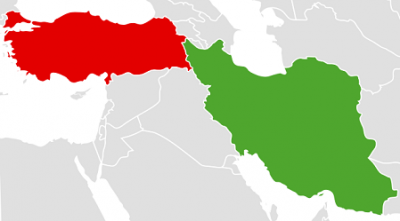

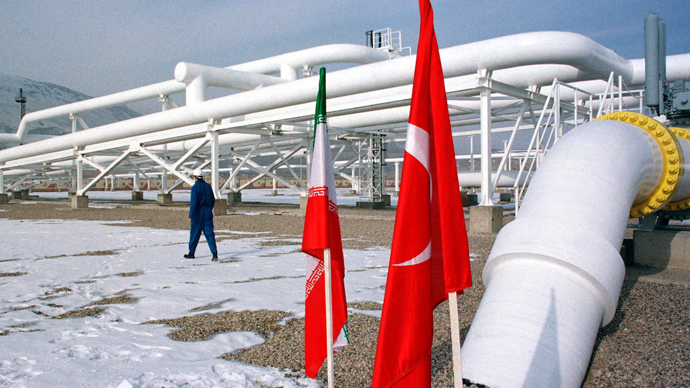



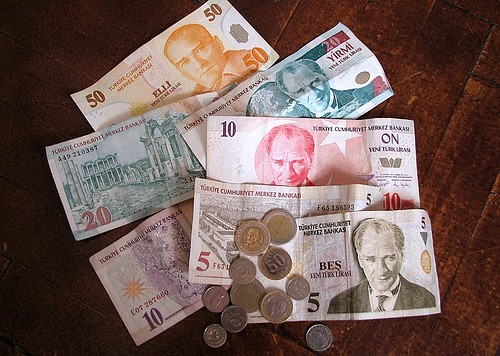

 del.icio.us
del.icio.us
 Digg
Digg